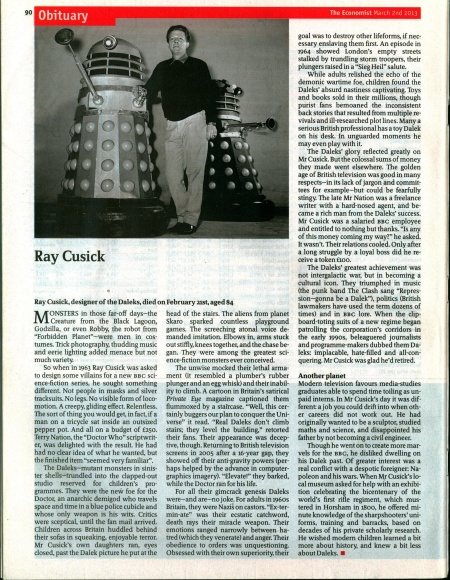Ray Cusick obituary
- Publication: The Economist
- Date: 2013-03-02
- Author:
- Page: 90
- Language: English
Ray Cusick, designer of the Daleks, died on February 21st, aged 84
MONSTERS in those far-off days—the Creature from the Black Lagoon, Godzilla, or even Robby, the robot from "Forbidden Planet"—were men in costumes. Trick photography, thudding music and eerie lighting added menace but not much variety.
So when in 1963 Ray Cusick was asked to design some villains for a new BBC science-fiction series, he sought something different. Not people in masks and silver tracksuits. No legs. No visible form of locomotion. A creepy, gliding effect. Relentless. The sort of thing you would get, in fact, if a man on a tricycle sat inside an outsized pepper pot. And all on a budget of £250. Terry Nation, the "Doctor Who" scriptwriter, was delighted with the result. He had had no clear idea of what he wanted, but the finished item "seemed very familiar".
The Daleks—mutant monsters in sinister shells—trundled into the clapped-out studio reserved for children's programmes. They were the new foe for the Doctor, an anarchic demigod who travels space and time in a blue police cubicle and whose only weapon is his wits. Critics were sceptical, until the fan mail arrived. Children across Britain huddled behind their sofas in squeaking, enjoyable terror. Mr Cusick's own daughters ran, eyes closed, past the Dalek picture he put at the head of the stairs. The aliens from planet Skaro sparked countless playground games. The screeching atonal voice demanded imitation. Elbows in, arms stuck out stiffly, knees together, and the chase began. They were among the greatest science-fiction monsters ever conceived.
The unwise mocked their lethal armament (it resembled a plumber's rubber plunger and an egg whisk) and their inability to climb. A cartoon in Britain's satirical Private Eye magazine captioned them flummoxed by a staircase. "Well, this certainly buggers our plan to conquer the Universe" it read. "Real Daleks don't climb stairs; they level the building," retorted their fans. Their appearance was deceptive, though. Returning to British television screens in 2005 after a 16-year gap, they showed off their anti-gravity powers (perhaps helped by the advance in computer-graphics imagery). "Elevate!" they barked, while the Doctor ran for his life.
For all their gimcrack genesis Daleks were—and are—no joke. For adults in 1960s Britain, they were Nazis on castors. "Ex-termin-ate" was their ecstatic catchword, death rays their miracle weapon. Their emotions ranged narrowly between hatred (which they venerate) and anger. Their obedience to orders was unquestioning. Obsessed with their own superiority, their goal was to destroy other lifeforms, if necessary enslaving them first. An episode in 1964 showed London's empty streets stalked by trundling storm troopers, their plungers raised in a "Sieg Heil" salute.
While adults relished the echo of the demonic wartime foe, children found the Daleks' absurd nastiness captivating. Toys and books sold in their millions, though purist fans bemoaned the inconsistent back stories that resulted from multiple revivals and ill-researched plot lines. Many a serious British professional has a toy Dalek on his desk. In unguarded moments he may even play with it.
The Daleks' glory reflected greatly on Mr Cusick. But the colossal sums of money they made went elsewhere. The golden age of British television was good in many respects—in its lack of jargon and committees for example—but could be fearfully stingy. The late Mr Nation was a freelance writer with a hard-nosed agent, and became a rich man from the Daleks' success. Mr Cusick was a salaried BBC employee and entitled to nothing but thanks. "Is any of this money coming my way?" he asked. It wasn't. Their relations cooled. Only after a long struggle by a loyal boss did he receive a token fioo.
The Daleks' greatest achievement was not intergalactic war, but in becoming a cultural icon. They triumphed in music (the punk band The Clash sang "Repression—gonna be a Dalek"), politics (British lawmakers have used the term dozens of times) and in BBC lore. When the clipboard-toting suits of a new regime began patrolling the corporation's corridors in the early 1990s, beleaguered journalists and programme-makers dubbed them Daleks: implacable, hate-filled and all-conquering. Mr Cusick was glad he'd retired.
Another planet
Modern television favours media-studies graduates able to spend time toiling as unpaid interns. In Mr Cusick's day it was different: a job you could drift into when other careers did not work out. He had originally wanted to be a sculptor, studied maths and science, and disappointed his father by not becoming a civil engineer.
Though he went on to create more marvels for the BBC, he disliked dwelling on his Dalek past. Of greater interest was a real conflict with a despotic foreigner: Napoleon and his wars. When Mr Cusick's local museum asked for help with an exhibition celebrating the bicentenary of the world's first rifle regiment, which mustered in Horsham in 1800, he offered minute knowledge of the sharpshooters' uniforms, training and barracks, based on decades of his private scholarly research. He wished modern children learned a bit more about history, and knew a bit less about Daleks.
Disclaimer: These citations are created on-the-fly using primitive parsing techniques. You should double-check all citations. Send feedback to whovian@cuttingsarchive.org
- APA 6th ed.: (2013-03-02). Ray Cusick obituary. The Economist p. 90.
- MLA 7th ed.: "Ray Cusick obituary." The Economist [add city] 2013-03-02, 90. Print.
- Chicago 15th ed.: "Ray Cusick obituary." The Economist, edition, sec., 2013-03-02
- Turabian: "Ray Cusick obituary." The Economist, 2013-03-02, section, 90 edition.
- Wikipedia (this article): <ref>{{cite news| title=Ray Cusick obituary | url=http://cuttingsarchive.org/index.php/Ray_Cusick_obituary | work=The Economist | pages=90 | date=2013-03-02 | via=Doctor Who Cuttings Archive | accessdate=15 December 2025 }}</ref>
- Wikipedia (this page): <ref>{{cite web | title=Ray Cusick obituary | url=http://cuttingsarchive.org/index.php/Ray_Cusick_obituary | work=Doctor Who Cuttings Archive | accessdate=15 December 2025}}</ref>
